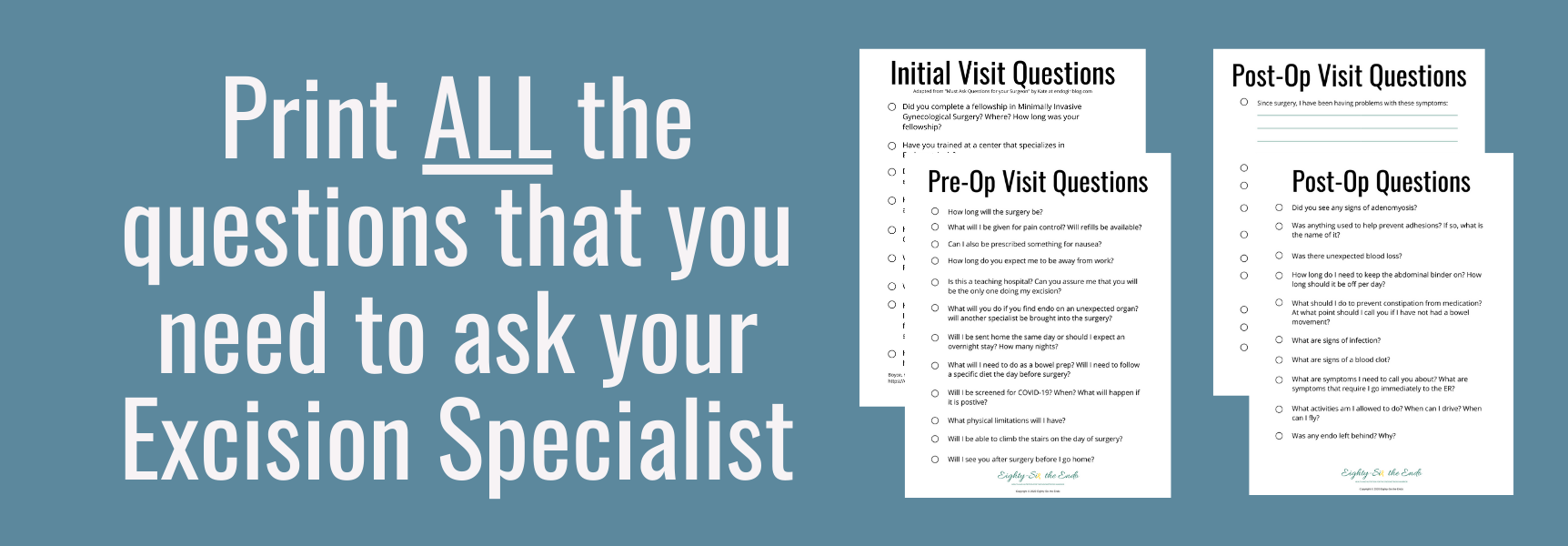As I’ve stated many times before, endometriosis is still not fully understood. This, inherently, leads to many inaccurate “facts” being shared among women and clinicians alike. The following are endometriosis myths that are told to endometriosis warriors around the world. These myths lead to unwarranted treatment decisions that can severely impact someone’s life or ability to have children. Likewise, these endometriosis myths can be blamed for the 7-10 years of delayed diagnosis for so many. So, it’s essential that these myths be debunked.
Myth 1: Pain is normal with periods.
 Okay, raise your hand if you have been told that pain with menstruation is normal (I see you out there, behind your screen!). But truly, I can easily assume that you raised your hand because this is something that is told to every one of us once we have started our menses. And to some degree, this is true.
Okay, raise your hand if you have been told that pain with menstruation is normal (I see you out there, behind your screen!). But truly, I can easily assume that you raised your hand because this is something that is told to every one of us once we have started our menses. And to some degree, this is true.
But the reality is that severe debilitating pain is NOT normal! And it is not helpful to be teaching pubescent girls that it is. It may be normal to have a mild dull ache or momentary sharp pain; but severe cramps that impede activities of daily living ARE NOT NORMAL.
Myth 2: Hysterectomy Cures Endometriosis
As it currently stands, there is NO CURE for endometriosis. There are only ways in which we can treat and manage the symptoms of endometriosis. Unfortunately, many physicians have been taught to recommend hysterectomy as a cure to endometriosis.
This stems from the century old theory that endometriosis is caused by retrograde menstruation, which means that during a person’s period, some of the blood and tissue travels out of the Fallopian tubes and into the pelvic cavity (4). The fact remains that most all menstruators have some retrograde menstruation at some point, which leaves us still questioning why some people develop endometriosis and others don’t (3).
And although a hysterectomy may be used to minimize endometriosis symptoms in some very severe cases, it should really only be used for definitive treatment of adenomyosis.
Also, having a hysterectomy is not a decision that should be made lightly due to its impact on procreation. For many people, removing the possibility of bringing a child into this world is a hard and important decision to make. In the end, whether you decide that a hysterectomy is right for you or not, it’s important that you understand these 3 key points:
- Hysterectomy does not cure endometriosis.
- Hysterectomy leads to the inability to become pregnant and carry a child.
- Endometriosis recurrence after hysterectomy is possible, especially if treated with hormone replacement therapy.
Myth 3: Pregnancy Cures Endometriosis
So many Ob-Gyn’s will recommend to their patients that they get pregnant to treat and/or cure their endometriosis. Not only is the recommendation extremely inconsiderate, but it is truly ignorant to recommend pregnancy to a population of patients who often battle infertility.
Even worse, many do not consider the age, life stage, or socioeconomic status of the patient. I cannot count how many times I have read about high school aged menstruators or single women being told to “just get pregnant.” It’s absolutely enraging to discount the many factors that play into bringing a baby into this world, as well as the financial responsibility of being a parent.
So, again, there is no known cure for endometriosis. However, during pregnancy progesterone levels are increased, which can lead to a reduction in symptoms (1). But this does not mean a cure has been achieved. Even so, many people still have severe endometriosis pain during pregnancy, or experience worse pain after birthing a child.
Myth 4: Endometriosis Equals Infertility
Infertility is a common diagnosis that accompanies endometriosis. However, having endometriosis does not automatically mean that you will struggle with infertility. Every individual is different. But if you are struggling to achieve pregnancy, talk to your doctor about your family goals. Many people will achieve pregnancy via fertility treatments or with proper endometriosis management.
Myth 5: Endometriosis is an Autoimmune Disease
Many of the symptoms associated with endometriosis are like symptoms related to autoimmune diseases (i.e. chronic pain, joint pain, weakness, fatigue, recurrent pregnancy loss).
So, does that make endometriosis an autoimmune disease? Some researchers have investigated this exact question.
This study lists the many ways in which endometriosis shares “characteristics with common autoimmune diseases such as rheumatoid arthritis, Crohn’s disease, and psoriasis”(3). And we know that having endometriosis increases the likelihood of developing autoimmune disease. However, more studies need to be done and we may not have a definitive autoimmune classification until we understand the full pathophysiology of endometriosis.
Basically, endometriosis is not classified as an autoimmune disease . . . yet.

Let’s Debunk the Myths
So now that you have this information under your belt, I challenge you to help our community correct the misinformation that is spread daily. If you hear or see this information, guide the person to accurate, evidence-based endometriosis information by asking if they have heard of the Center for Endometriosis Care, Extrapelvic Not Rare, or the Endometriosis Summit.
Not only will this provide them a chance to learn accurate information, but it gives you a chance to correct them without being demeaning or accusatory.


- What Is Endometriosis? Causes, Symptoms and Treatments (n.d.). Endometriosis Foundation of America [webpage]. Retrieved May 23, 2020, from https://www.endofound.org/endometriosis
- Rizk, B., Fischer, A. S., Lotfy, H. A., Turki, R., Zahed, H. A., Malik, R., Holliday, C. P., Glass, A., Fishel, H., Soliman, M. Y., … Herrera, D. (2014). Recurrence of endometriosis after hysterectomy. Facts, views & vision in ObGyn, 6(4), 219-27. Retrieved from https://www.ncbi.nlm.nih.gov/pmc/articles/PMC4286861/
- Nothnick, W. B. (2001). Treating endometriosis as an autoimmune disease. Fertility and Sterility, 76(2), 223 – 23. Retrieved from https://www.fertstert.org/article/S0015-0282(01)01878-7/fulltext
- Endometriosis (n.d.). UCLA Health [webpage]. Retrieved May 23, 2020, from http://obgyn.ucla.edu/endometriosis



